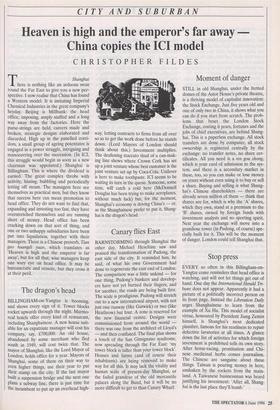Moment of danger
STILL in old Shanghai, under the fretted domes of the Astor House's private theatre, is a thriving model of capitalist innovation: the Stock Exchange. Just five years old and one of only two in China, it shows what you can do if you start from scratch. The prob- lems that beset the London Stock Exchange, costing it years, fortunes and the jobs of chief executives, are behind Shang- hai. This is a paperless exchange. All stock transfers are done by computer, all stock ownership is registered centrally by the exchange: no transfer notes, no share cer- tificates. All you need is a ren gou zhong, which is your card of admission to the sys- tem, and there is a secondary market in these, too, so you can make or lose money on yours without even using it to buy or sell a share. Buying and selling is what Shang- hai's Chinese shareholders — there are already seven million of them — think that shares are for, which is why the 'A' shares, which they own, stand at a premium to the 'B' shares, owned by foreign funds with investment analysts and no sporting spirit. Next year the exchange will move into a grandiose tower (in Pudong, of course) spe- cially built for it. This will be the moment of danger. London could tell Shanghai that.


























































 Previous page
Previous page